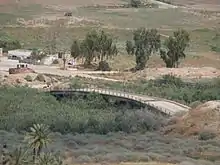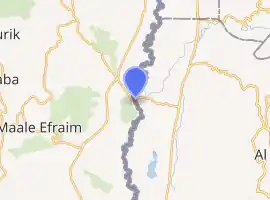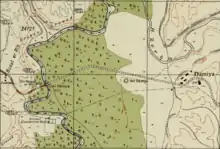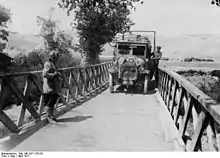Jisr ed Damiye
Jisr ed-Damiye, (Arabic: جسر الدامية, romanized: Jisr ed Damieh, lit. 'Bridge of ed-Damieh')[1] (also Prince Muhammad Bridge) known in Israel as Gesher Adam (Hebrew: גשר אדם) is a bridge over the Jordan River between the West Bank and the Balqa Governorate of Jordan.[2] It was the name of a bridge over the Jordan River on the Nablus – Es Salt – Amman Road.
Jisr ed-Damiye | |
|---|---|
 | |
| Coordinates | 32°06′10″N 35°32′07″E |
| Crosses | Jordan River |
| Locale | Israel and Damia, Jordan |
| Official name | Jisr ed-Damiye |
| Characteristics | |
| Design | Arch |
| History | |
| Opened | Roman period (?) |
| Location | |

| |
In 1918 it was notable as for the Capture of Jisr ed Damieh military action. After 1991 it was used only for goods transported by truck between Israel, the West Bank and Jordan until its closure for security reasons some time between 2002 and 2005 during the Second Intifada.[3] As of 2014, the Israeli side is part of a closed military area.
History



The site was used as a crossing between the west and east banks of the Jordan due to good access in both directions over the Far'a[4]/Tirzah Valley to the west and the Zarqa/Yabbok Valley to the east. In 1849, William F. Lynch described the ruins of the old bridge as "a Roman bridge spanning a dry bed, once, perhaps, the main channel of the Jordan, now diverted in its course. The bridge was of Roman construction, with one arch entire, except a longitudinal fissure on the top, and the ruins of two others, one of them at right angles with the main arch, probably for a mill-sluice. The span of the main arch was fifteen feet; the height, from the bed of the stream to the keystone, twenty feet."[5]
Still visible are ruins of several consecutive bridges:[6] the stone bridge built by the Mamluk sultan Baibars in the 13th century, blown up by Haganah forces during Operation Markolet (known as the Night of the bridges) on the night of 16–17 June 1946; a British bridge built soon after, and a Jordanian one from the 1950s, both destroyed by the Israeli army during the 6-Day War of 1967. Right after the war, in August 1967, Israeli Minister of Defense Moshe Dayan allowed the uncontrolled traffic of goods between the Palestinians and Jordan using the ford of Damiya, as a way of avoiding the economic collapse of the West Bank and for avoiding Palestinian discontent, since the Israeli markets were not open yet to Palestinian produce. This was an element of what became known as the "policy of the open bridges".[7]
In January 1968 Jordan built a prefabricated metal bridge to facilitate the trade connections to the West Bank. The bridge was open to both goods and people, but fighting due to the 1967–1970 War of Attrition led to the 1968 Battle of Karameh during which the bridge was damaged by Jordanian artillery who tried to prevent Israeli armour from passing. In 1969 the Jordanians blew up parts of this bridge,[8] but it was repaired at some later point. During the Black September events in 1970, the bridge was again closed for several days during the fighting between the Palestinians and the Jordanian army. The Jordanians repaired the bridge in early 1975 after it had been damaged by floods, and performed some amendments in 1976.[9] The Jordanian metal bridge still stands but is currently out of use. In 2014 the Palestinian authorities were negotiating with Jordan the possibilities of reopening traffic between the two sides.[10]
References
- Committee of the Palestine Exploration Fund (1838). The Survey of Western Palestine. Palestine Exploration Fund. p. 98. Retrieved 27 January 2015.
- "Where is Jisr ed Damiye, Jordan?". geotargit.com. Retrieved 27 January 2015.
- "PA, Jordan working to reopen bridge Israel closed in 2005". Ma'an News Agency. 2014-02-13. Retrieved 2014-11-02.
- "The Wadi el-Far'a & Our Research Area". Calvin College, Grand Rapids, Michigan. Retrieved 2014-11-02.
- Lynch, William Francis (1856). Narrative of the United States' Expedition to the River Jordan and the Dead Sea. Blanchard and Lea. p. 249.
- "Adam Bridge". BibleWalks.com. Retrieved 2014-11-02.
- "The Jordan Bridges". Israel Ministry of Foreign Affairs. 1994-02-01. Retrieved 2014-11-02.
- "Jordanians Blow Up Part of Damiya Bridge, 1 of 3 West Bank Links with Their State". Jewish Telegraphic Agency. 1969-01-08. Retrieved 2014-11-02.
- "1967 Israel Original old photograph, The Damia Bridge explosion; uses Hebrew Wikipedia information passed through Google Translate". eBay. 2014-11-02. Retrieved 2014-11-02.
- "PA, Jordan working to reopen bridge Israel closed in 2005". Ma'an News Agency. 2014-02-13. Retrieved 2014-11-02.
External links
| Wikimedia Commons has media related to Jisr ed Damiye. |
- BibleWalks.com – Adam Bridge
- – For the role of Damiya Bridge in the 1967 6-Day War
- – For the role of Damiya Bridge in the March 1968 Battle of Karameh
- "Jisr Ed Damiye Monthly Climate Average, Jordan". worldweatheronline.com. Retrieved 27 January 2015.